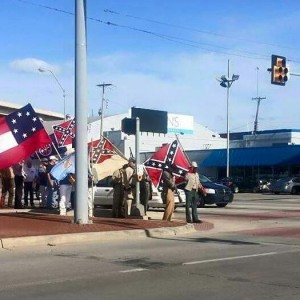Last week I argued that the Confederate flags have been symbols of racism and oppression from the day they were first conceived. Yesterday, Ta-Nehisi Coates made a similar case, in significantly more detail:
https://twitter.com/tanehisicoates/status/613169672331087872
This fairly well settles whether Confederate symbolism is rightfully considered oppressive and racist. What I’ve been seeing on my feeds of late, though, are posts from self-identified progressives who have claimed that so-called “hate speech” ought not be considered legally protected speech. I’m not going to source these (there is no need for a public shaming) but here are a few recent examples:
The next time someone tell you that the Confederate Flag is Free Speech tell them no its a Symbol of Racism!
— AC
This isn’t speech, it’s meant to be intimidating. That flag is a flag of slavery and terrorism, lynchings, rapes, and numerous atrocities were committed by lovers of that flag. What does it say about our political system when we allow our weakest to be intimidated by the strongest?
— NW
1st amendment does not allow hate speech. Difference between free speech & hate speech.
— MN
You get the idea. If some given act of speech is considered hateful, then said speech must not deserve legal protection. And here is where I must part ways with my “progressive” fellow travelers. The whole point of legally protected speech is to prevent the government from manipulating the electorate by deciding that some ideas must be considered not merely socially taboo but also punishable at law.

The entire point of free speech laws is to protect unpopular speech, seeing as generally popular ideas will not be attacked by those who hope to retain power in a democratic system. On the off chance that a small minority has more defensible views than the general public, constitutional guarantees of free speech are designed to ensure that those ideas—however unpopular—have the opportunity to compete in a free marketplace, without being squelched by majoritarian laws designed to preserve orthodox thinking.
Imagine, if you will, two flags. The first is stitched from silkscreens of the most controversial Charlie Hebdo covers, the second is one of the more widely-known Confederate designs. In both cases, some people would fly the flag proudly, others would burn it to demonstrate their opposition, and still others would declare it hate speech and try to have it banned by law. It is only that third group which I oppose.
If there are any principled arguments in favor of preventing government interference with speech which would protect unpopular blasphemous or irreligious speech but not unpopular hateful or racist speech, I would be interested in hearing them. Until then, I’m going to err on the side of untrammeled free expression, for even the worst of ideas.
